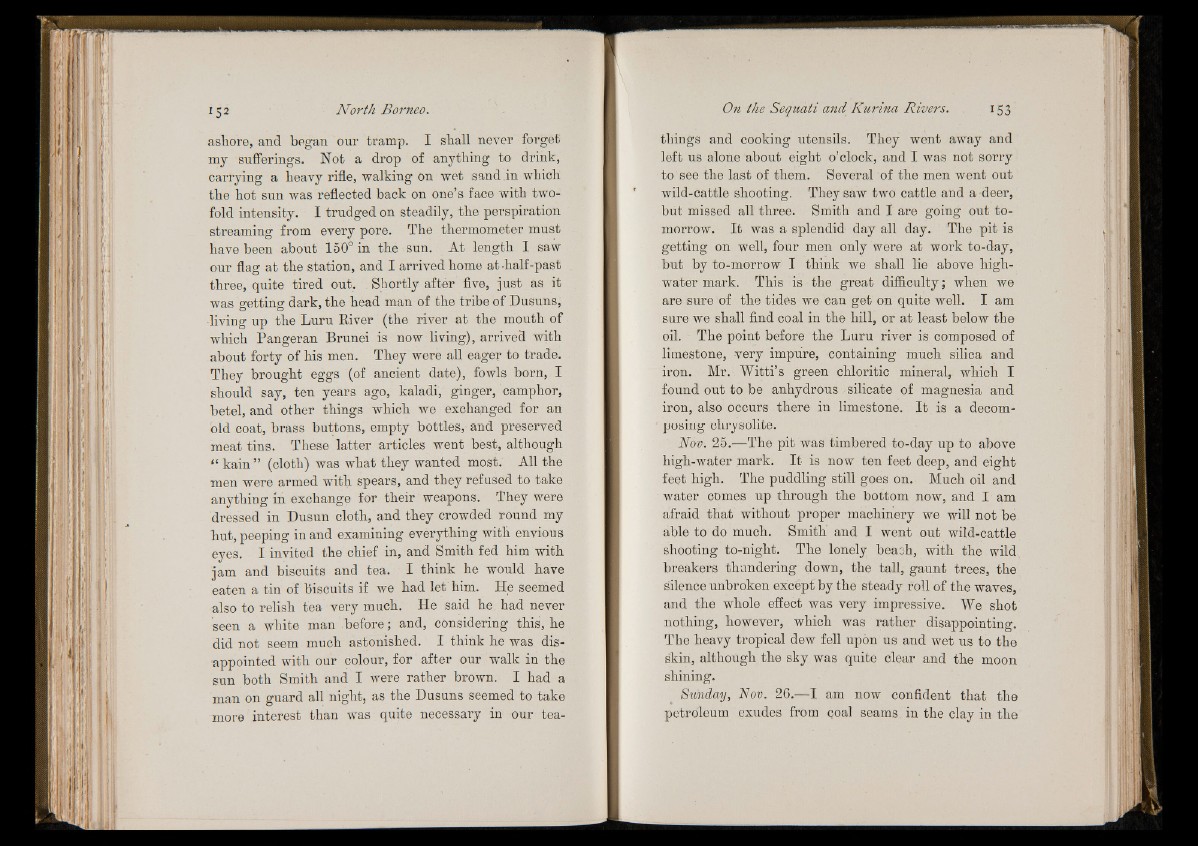
ashore, and began our tramp. I shall never forget
my sufferings. Not a drop of anything to drink,
carrying a heavy rifle, walking on wet sand in which
the hot sun was reflected back on one’s face with twofold
intensity. I trudged on steadily, the perspiration
streaming from every pore. The thermometer must
have been about 150° in the sun. At length I saw
our flag at the station, and I arrived home at-half-past
three, quite tired out. Shortly after five, just as it
was getting: dark, the head man of O O J the tribe of Dusuns,
■living up the Luru Eiver (the river at the mouth of
which Pangeran Brunei is now living), arrived with
about forty of his men. They were all eager to trade.
They brought eggs (of ancient date), fowls born, I
should say, ten years ago, kaladi, ginger, camphor,
betel, and other things which we exchanged for an
old coat, brass buttons, empty bottles, and preserved
meat tins. These latter articles went best, although
A kain ” (cloth) was what they wanted most. All the
men were armed with spears, and they refused to take
anything in exchange for their weapons. They were
dressed in Dusun cloth, and they crowded round my
hut, peeping in and examining everything with envious
eyes. I invited the chief in, and Smith fed him with
jam and biscuits and tea. I think he would have
eaten a tin of biscuits if we had let him. He seemed
also to relish tea very much. He said he had never
seen a white man before; and, considering this, he
did not seem much astonished. I think he was disappointed
with our colour, for after our walk in the
sun both Smith and I were rather brown. I had a
man on guard all night, as the Dusuns seemed to take
more interest than was quite necessary in our teathings
and cooking utensils. They went away and
left us alone about eight o’clock, and I was not sorry
to see the last of them. Several of the men went out
wild-cattle shooting. They saw two cattle and a deer,
but missed all three. Smith and I are going out tomorrow.
I t was a splendid day all day. The pit is
getting on well, four men only were at work to-day,
but by to-morrow I think we shall lie above high-
water mark. This is the great difficulty; when we
are sure of the tides we can get on quite well. I am
sure we shall find coal in the hill, or at least below the
oil. The point before the Luru river is composed of
limestone, -very impure, containing much silica and
iron. Mr. Witti’s green chloritic mineral, which I
found out to be anhydrous silicate of magnesia and
iron, also occurs there in limestone. I t is a decomposing
chrysolite.
Nov. 25.—The pit was timbered to-day up to above
high-water mark. I t is now ten feet deep, and eight
feet high. The puddling still goes on. Much oil and
water cDmes up through the bottom now, and I am
afraid that without proper machinery we will not be
able to do much. Smith and I went out wild-cattle
shooting to-night. The lonely beach, with the wild
breakers thundering down, the tall, gaunt trees, the
silence unbroken except by the steady roll of the waves,
and the whole effect was very impressive. We shot
nothing, however, which was rather disappointing.
The heavy tropical dew fell upon us and wet us to the
skin, although the sky was quite clear and the moon
shining.
Sunday, Nov. 26.—I am now confident that the
petroleum exudes from coal seams in the clay in the